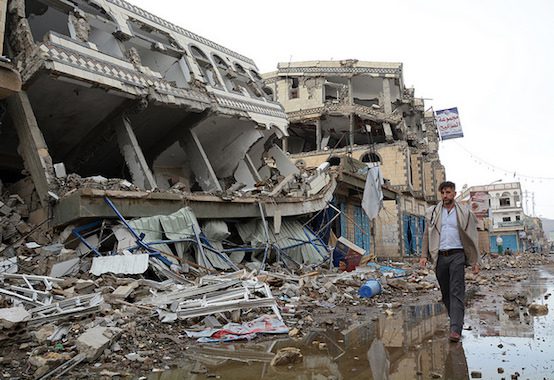The Indefensible U.S.-Backed War on Yemen Continues

Human Rights Watch adds to the list of violations committed by the Saudi-led coalition in Yemen:
HRW said that “taken together, the attacks on factories and other civilian economic structures raise serious concerns that the Saudi-led coalition has deliberately sought to inflict widespread damage to Yemen’s production capacity [bold mine-DL].”
The bombings are coupled with a naval and air embargo imposed on Yemen since March last year, causing severe shortages of fuel, cash and basic necessities as Yemen depends on imports of its 90 percent of its food products.
Long after the fighting stops in Yemen, the people of Yemen will be left with wrecked infrastructure and a devastated economy because of the bombing campaign that HRW and other human rights organizations have been criticizing for over a year. Yemen was already the poorest Arab country, and now its development has been set back by decades. Beyond the immediate loss of life and destruction of property caused by the intervention, the Saudi-led, U.S.-backed war on Yemen is inflicting enormous harm on the country’s future prospects.
As I’ve said before, that blockade has been largely responsible for creating the near-famine conditions in the country. Yemen was heavily dependent on imports for its food supply, and the blockade caused a dramatic decrease in the commercial imports that can enter the country, so the effect of the coalition blockade has been catastrophic. Aid shipments are entirely insufficient to make up the shortfall that the blockade created. William Lambers reminds us that the World Food Program (WFP) has warned that at least 7 million people in Yemen are currently living at emergency levels of food insecurity, which is only one level removed from famine, and it has also said that another 7 million are at risk of the same. Half of the civilian population is at serious risk of starvation, and that is mostly due to the Saudi-led, U.S.-backed intervention and blockade.
Daniel DePetris calls on the U.S. to distance itself from the Saudi-led campaign that it has supported for the last fifteen and a half months:
U.S. assistance to Saudi Arabia in Yemen has come about almost as a reflex. If Riyadh requests U.S. military capabilities, the U.S. agrees with barely any questions asked. This no-strings-attached aid, however, has merely made the situation in Yemen worse by providing the Saudis with the false sense of confidence that Washington’s unique military capacity will be available regardless of how it conducts the war.
I agree with most of this. Unfortunately, the Saudis have reason to be confident that most U.S. arms sales and shipments will continue regardless of how they use them. They face no real criticism from the administration for their bombing of civilian areas and their use of inherently indiscriminate weapons (i.e., cluster munitions). On the contrary, administration officials are more likely to echo Saudi talking points or defend the coalition’s actions. There is an effort in Congress to impose stricter conditions on the transfer of weapons to the Saudis, and the administration has belatedly suspended the transfer of cluster bombs, but on the whole the Saudis and their allies have been able to do as they please with minimal consequences in Washington. That is to the lasting shame of this administration and most members of Congress, but regrettably that is what our government has done about a war that it has backed all the way from the beginning.
Comments